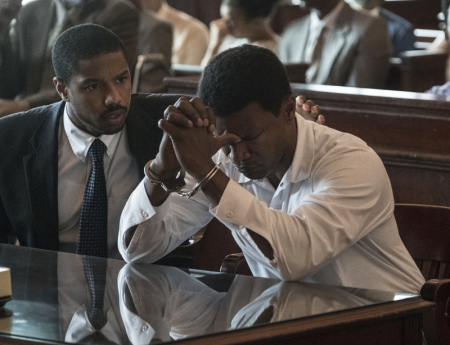‘Just Mercy' actors speak on biblical themes in film: 'Faith is directly connected to hope'

NEW YORK — Michael B. Jordan, Brie Larson, and the cast of “Just Mercy” opened up about the biblical themes woven throughout the legal drama and why they believe hope and justice are rooted in faith.
Jordan both co-produced and stars alongside Jamie Foxx in “Just Mercy,” a film based on the powerful and thought-provoking true story of lawyer Bryan Stevenson (Jordan) and his history-making battle for justice.
After graduating from Harvard, Bryan moves to Alabama where he takes on the case of Walter McMillian (Foxx), who, in 1987, was sentenced to die for the murder of an 18-year-old girl, despite a preponderance of evidence proving his innocence and the fact that the main testimony against him came from a criminal with a motive to lie.
In the years that follow, Bryan becomes embroiled in a labyrinth of legal and political maneuverings, as well as overt and unabashed racism as he fights for Walter, and others like him, with the odds — and the system — stacked against them.
During a sit-down interview with The Christian Post, Jordan explained that Stevenson’s Christian faith drives his work, as the public interest lawyer continues to advocate for the underserved and poorly represented through his nonprofit organization, the Equal Justice Initiative. Thus, it was only fitting that Stevenson’s faith — along with spiritual themes of mercy, compassion, and justice — to remain front and center throughout the film.
“Faith and hope is a big part of Bryan Stevenson's upbringing,” Jordan said. “He grew up in the church. I did as well, and so did Jamie. And for all of us, faith is directly connected to hope. Bryan is an advocate for hope and optimism, so those were things that were just very important to the story. That’s one of the reasons why we wanted to make sure that was incorporated.”
In addition to Walter, “Just Mercy” shares the stories of several other inmates on death row who are grappling with their looming execution.
“When you're on death row, hope is all you really have when you're condemned to death. That’s it,” Jordan said. “So besides just withering away in those four walls, Bryan instilled hope in these people. Walter McMillan inspired hope into other inmates, that were on death row. Hope is the tinder, the support system, that’s holding these people together.”
“Without hope,” he added, “you don’t have any chance for justice.”

Jordan added that the visual of a black man saving another black man is “extremely important” because it fosters unity and draws attention to a rarely-seen narrative.
“We don’t see that often,” he said. “I hope people will subconsciously start to connect those dots and it instigates them to be more caring and to stop this violence and self-hating and causes them to build a bond and brotherhood between black and brown people. I think that that's kind of like lost a little bit. That’s why I wanted to make sure that that was at the forefront: A black man that's saving a black man.”
Stevenson is not alone in his advocacy work. He’s supported by local advocate Eva Ansley (Larson), who has put herself at odds with most in her neighborhood — and at personal risk — by teaming up with him to help Walter and others in similar circumstances.
The Oscar-winning actress told CP that faith and hope are the “foundation” of what “Just Mercy” is all about.
“We all have to have that belief in a better future in order to work toward it,” she said. “Despondency gets us nowhere. Hopelessness gets us nowhere. That keeps us exactly where we are. It is that expectation of what our future can be and the belief in humanity itself that we will work together and get there. That's who Brian is, so that's what the film is.”

Tim Blake Nelson brilliantly plays perjuring convict Ralph Myers whose pivotal testimony against Walter is called into question. He told CP that because “Just Mercy” isn’t self-righteous or political, it will effectively change hearts and minds for the better.
“The movie delivers facts without ever banging you over the head with how you should think or feel,” he said. “And because of that, I believe it's all the more effective in advocating for more sensitivity, more of an understanding of what's broken in our justice system and in advocacy for change.”
Actor Rob Morgan, who plays real-life death row inmate Herbert Richardson, said the film reinforces Stevenson’s oft-repeated mantra: We all need grace; we all need redemption, and none of us want to be judged by the worst thing we’ve ever done.
“I think if people were to understand that more and take that on as a part of their mindset, they will start looking out into the world with less prejudice,” he said.
For Jordan, the goal of “Just Mercy” is simple: “We wanted to create conversation and inspire thought, but also send you through a range of emotions,” he told CP. “We wanted you to feel frustrated, sad, but also inspired and hopeful. But in the end, we want you to ask, ‘What can I do to be part of the solution?’”
The film is slated for limited release on Dec. 25 and will be in theaters nationwide starting Jan. 10, 2020. “Just Mercy” has been rated PG-13 for thematic content, including some racial epithets.





















